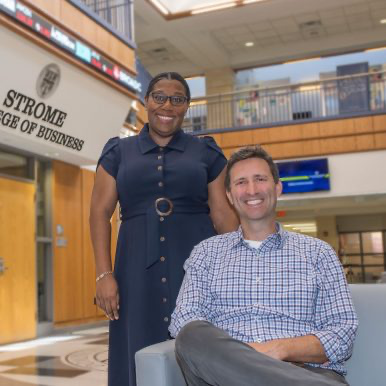From Virginia Business M.J. MCATEER
When COVID-19 hit in the spring of 2020, Cindy R. Earl lost her job as a furniture company’s sales rep.

Cindy Earl, who started an eldercare private investigation company, is one of several participants at Old Dominion University’s Hudgins Transitional Entrepreneurship Lab. Jay O’Toole is its deputy director. Photo by Mark Rhodes
But the Portsmouth resident’s sudden unemployment came with a positive side effect: She had time to assume care of her ailing grandmother after the pandemic had shuttered the assisted living facility where her grandmother had lived. It was an experience that turned out to be unexpectedly inspirational.
“I’m an inquisitive person,” Earl says, and seeing the problems that her grandmother had suffered as an Alzheimer’s patient, which included dehydration and an unexplained injury, made her want to start a company dedicated to investigating elder abuse. She didn’t really know how to go about doing that, however, and that’s where Old Dominion University’s Hudgins Transitional Entrepreneurship Lab came in.
Launched in 2019 with a $1.2 million gift from Marsha Hudgins, an ODU alumna who owns a construction company in Hampton, the academic research enterprise is dedicated to educating and supporting would-be entrepreneurs who live in underserved and marginalized communities in the Hampton Roads area. Its focus is on aiding women, minorities, veterans, immigrants, refugees and formerly incarcerated people.
“Entrepreneurial efforts have long provided much less resistance and more immediate reward for hard work and creativity for groups with no readily available opportunities in the business world,” Hudgins says, explaining why she, the granddaughter of Greek immigrants, wanted to provide a leg up to other prospective entrepreneurs. But, for the disadvantaged, hard work and creativity often are not enough to ensure success.
According to a 2020 National Bureau of Economic Research study, Black entrepreneurs received an average of $35,205 in startup capital, compared with $106,720 for white entrepreneurs. And although venture capital for Black-owned startups doubled in 2021, according to Crunchbase, only 1.2% of all VC funding goes to Black entrepreneurs.
“Our mentees have the passion and the ideas,” says Hudgins Lab Director Robert J. Pidduck, also an assistant professor of entrepreneurship at ODU’s Strome College of Business.
“They are eager to get something off the ground,” he says, but they often lack the specific skills necessary to launch and sustain an enterprise — as well as the professional connections that make the wheels of commerce go ’round.
Financing can be a big sticking point, though Pidduck labels a sole focus on money as a distraction. “Throwing money at anyone doesn’t solve deeper problems,” such as lack of know-how and business contacts, he says.
To tackle those issues, the Norfolk entrepreneurship research lab draws on both academic assets and community resources.
During the height of the pandemic, the lab offered virtual panels, seminars, workshops and informal gatherings focusing on make-or-break subjects such as marketing, accounting and the use of crowdfunding to bypass possible racial bias in lending.
Foremost in its multipronged approach are monthly mentoring meetings to provide one-on-one guidance to entrepreneurs who have started businesses ranging from body care and bookkeeping enterprises to counseling providers and urban agriculture companies.
During these sessions, Jay O’Toole, deputy director of the lab and an assistant professor in the management department, helped Earl build a website for what would become her private investigation firm, Proof Please LLC. He also assisted her in writing a capability statement for government contracting opportunities and in applying for a $2,000 grant that she ultimately received from the Portsmouth Economic Development Authority. “He was available whenever I needed him to be,” Earl says.
Aletha Russell, another of the lab’s five mentees, received O’Toole’s help in launching her online body care products business, She’s Steamy. He guided her through building a website, obtaining a business license and registering her business with the state government.
Almost as important as such hands-on help was the lab’s assistance in connecting Earl and Russell to professional networks and to local entrepreneurs who already have been there and could share advice and lessons learned.
“You don’t need an MBA to learn these skills,” Pidduck says.
The lab, as the professor conceives it, functions as “a hub, a synergizing force” for area entrepreneurs, and he hopes it will keep growing in coming years. Last fall, O’Toole received a $15,000 grant from the Small Business Development Center to help graduate students and research assistants conduct a study into the needs of Virginia’s minority entrepreneurs. That project is furthering one of the lab’s other goals, to generate research with practical applications.
In 2020, Anil Nair, then chairman of Strome’s Department of Management, was awarded a $400,000 grant as part of the Ewing Marion Kauffman Foundation’s Knowledge Challenge initiative, which supports research that advances entrepreneurship and economic mobility. Nair says the Hudgins lab will use the funding to expand its outreach to middle and high school students, add more mentees, pursue local partnerships and hold conferences to spur studies in the field, all while showcasing the lab’s initiatives.
“Things don’t come that easily [to our mentees],” Nair says, but with the help of the Hudgins lab, the situation is improving for some of the mentees.
At her P.I. business, Earl now has about eight clients for whom she runs background checks, wellness checks and sometimes conducts surveillance in cases where neglect or physical, sexual, emotional or financial abuse is suspected.
For Russell, 2021 was all about putting plans in motion for She’s Steamy, but this year sales of her all-natural body oils, scrubs, butters and salts have really taken off, thanks in part to the lab, which, she says, has “been there step by step. I’ll stick with Dr. O’Toole through thick and thin.”





